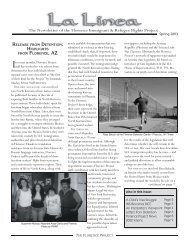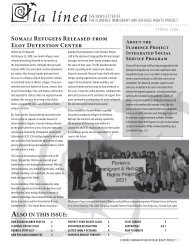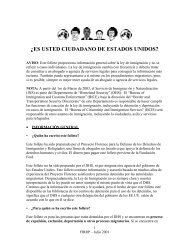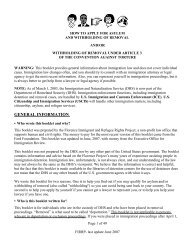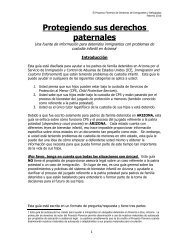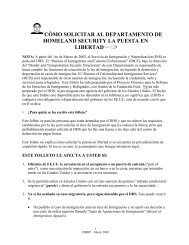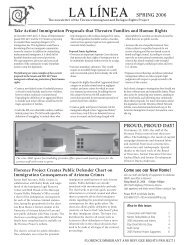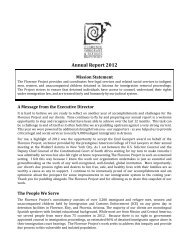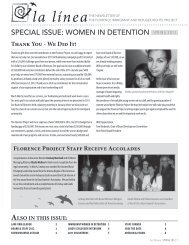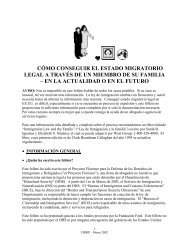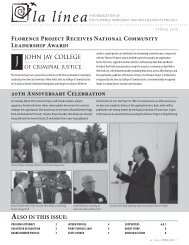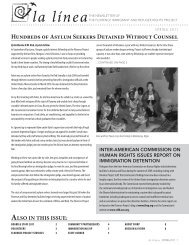quick reference chart and annotations for determining immigration ...
quick reference chart and annotations for determining immigration ...
quick reference chart and annotations for determining immigration ...
Create successful ePaper yourself
Turn your PDF publications into a flip-book with our unique Google optimized e-Paper software.
Immigrant Legal Resource Center, Florence Immigrant <strong>and</strong> Refugee Rights Project,<br />
Maricopa County Public Defender August 2012<br />
substance grounds. Coronado-Durazo v. INS, 123 F.3d 1322, 1326 (9th Cir. 1997) (ARS § 13-1002 is not<br />
a deportable controlled substance offense even where the offense solicited related to controlled<br />
substances, disapproving Matter of Beltran, 20 I&N Dec. 521, 528 (BIA 1992)). Thus a plea to<br />
solicitation to possess a controlled substance avoids deportability altogether in a drug case. It also should<br />
not cause inadmissibility as a drug conviction. However, soliticitation to possess a controlled substance<br />
<strong>for</strong> sale is a CMT, <strong>and</strong> there<strong>for</strong>e might cause the person to become inadmissible or deportable under the<br />
CMT grounds. Barragan-Lopez v. Mukasey, 508 F.3d 899 (9th Cir. 2007). Even more damaging, if<br />
evidence shows that the solicitation related to trafficking in drugs, the conviction will cause the person to<br />
become inadmissible by giving the government “reason to believe” the person has engaged in drug<br />
trafficking. This penalty does not require a drug conviction. See 8 USC § 1182(a)(2)(C).<br />
Other Grounds: In General. A person is deportable under the firearms ground <strong>for</strong> “offering to<br />
sell” a firearm, but not <strong>for</strong> other solicitation offenses. Solicitation may prevent deportability under the<br />
domestic violence ground.<br />
Note: solicitation incorporated into substantive offenses, such as offering to commit a drug<br />
offense. The Ninth Circuit has held that offering to commit a drug trafficking offense is not an<br />
aggravated felony even when the offense is included in a drug statute instead of under a separate<br />
“generic” statute such as ARS § 13-1002. Rosas-Castaneda v. Holder, 655 F.3d 875, 885 (9th Cir. 2011);<br />
U.S. v Rivera-Sanchez, 247 F.3d 905 (9th Cir. 2001) (en banc) (Cali<strong>for</strong>nia statute prohibiting offering to<br />
sell a drug is not an aggravated felony). This means that a plea to, e.g., offering to sell or offering to<br />
transport <strong>for</strong> sale under ARS §§13-3405(A)(4), 13-3407(A)(7), or 13-3408(A)(8) should avoid conviction<br />
of an aggravated felony.. In practice, however, <strong>immigration</strong> judges are not consistently applying this<br />
precedent to Arizona law <strong>and</strong> will often find the offense to be an aggravated felony. For this reason,<br />
Solicitation under § 13-1002 is a much better plea. If Solicitation is not available, the plea either should<br />
be explicitly to offering to commit the offense, or it should leave the “record of conviction” vague enough<br />
so that offering to sell or transport is an option. See “Note: Safer Pleas.”<br />
The Ninth Circuit has found that a conviction under a “specific” solicitation statute, such as<br />
offering to possess <strong>for</strong> sale, offering to transport <strong>for</strong> sale, or offering to sell, would render a noncitizen<br />
removable <strong>for</strong> an offense relating to a controlled substance. Rosas-Castaneda v. Holder, 655 F.3d 875,<br />
881 (9th Cir. 2011); Mielewczyk v. Holder, 575 F.3d 992, 998 (9th Cir. 2009). While counsel can argue<br />
that this holding conflicts with the Ninth Circuit’s en banc decision in U.S. v. Rivera-Sanchez, 247 F.3d<br />
905, 909 (9th Cir. 2001) (en banc) (Calif. Health & Safety § 11360), which makes no distinction between<br />
generic solicitation <strong>and</strong> specific solicitation statutes, a conviction <strong>for</strong> “offering” to possess <strong>for</strong><br />
sale/transport <strong>for</strong> sale/sell will likely be found removable as a controlled substance offense. Whenever,<br />
possible, counsel should attempt to plead to the generic solicitation statute under ARS § 13-1002.<br />
3. Conspiracy, A.R.S. § 13-1003.<br />
Summary: Conspiracy will likely incur the same <strong>immigration</strong> consequences as the underlying<br />
crime, with the possible exception of domestic violence; see “other grounds.” However, <strong>immigration</strong><br />
counsel can argue that the Arizona definition of “conspiracy” is broader than the federal definition of<br />
“conspiracy” located at 18 U.S.C. § 371 <strong>for</strong> two reasons. First, the federal definition requires that the act<br />
be committed by one of the co-conspirators, while the Arizona definition allows the act in question to be<br />
committed by a person who is not one of the co-conspirators. Second, the federal definition limits<br />
conspiracy liability to the persons with whom the defendant directly conspired, while the Arizona<br />
definition permits a conviction <strong>for</strong> working with “the conspirator of one’s conspirator.” See ARS § 13-<br />
Arizona Criminal Chart with Explanatory Endnote – August 2012<br />
14



